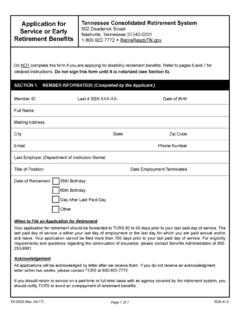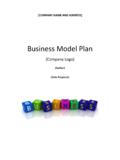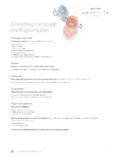Transcription of Business Plan for Startup Business - Tennessee
1 Page 2 of 26. Business plan OWNERS. Business name: Example Corporation Address: Address Line 1. Address Line 2. City, ST 22222. Telephone: 222-333-4444. Fax: 111-222-3333. Email: Page 3 of 26. I. Table of contents I. Table of 3. II. Executive 4. III. General Company 5. IV. Products and 6. V. marketing plan .. 7. VI. Operational 14. VII. Management and 17. VIII. Personal financial statement .. 18. IX. Startup Expenses and 19. X. Financial 20. XI. 23. XII. Refining the 24. Page 4 of 26. II. Executive summary Write this section last! We suggest you make it 2 pages or less.
2 Include everything that you would cover in a 5-minute interview. Explain the fundamentals of the proposed Business : what will your product be, who will be your customers, who are the owners, what do you think the future holds for your Business and your industry? Make it enthusiastic, professional, complete and concise. If applying for a loan, state clearly how much you want, precisely how you are going to use it, and how the money will make your Business more profitable, thereby ensuring repayment. Page 5 of 26. III. General Company Description What Business will you be in?
3 What will you do? Mission Statement: Many companies have a brief mission statement, usually in thirty words or less, explaining their reason for being and their guiding principles. If you want to draft a mission statement, this is a good place to put it in the plan . Followed by: Company goals and objectives: Goals are destinations -- where you want your Business to be. Objectives are progress markers along the way to goal achievement. For example, a goal might be to have a healthy, successful company that is a leader in customer service and has a loyal customer following.
4 Objectives might be annual sales targets and some specific measures of customer satisfaction. Business philosophy: What is important to you in Business ? To whom will you market your products? your target market? (State it briefly here - you will do a more thorough explanation in the marketing section). Describe your industry. Is it a growth industry? What changes do you foresee in your industry, short term and long term? How will your company be poised to take advantage of them? your most important company strengths and core competencies: What factors will make the company succeed?
5 What do you think your major competitive strengths will be? What background experience, skills, and strengths do you personally bring to this new venture? Legal form of ownership: Sole Proprietor, Partnership, Corporation, Limited Liability Corporation (LLC)? Why have you selected this form? Page 6 of 26. IV. Products and services Describe in depth your products and/or services (technical specifications, drawings, photos, sales brochures, and other bulky items belong in the Appendix). What factors will give you competitive advantages or disadvantages?
6 For example, level of quality or unique or proprietary features. What are the pricing, fee or leasing structures of your products and/or services? Page 7 of 26. V. marketing plan Notes on preparation: Market research - Why? No matter how good your product and your service, the venture cannot succeed without effective marketing . And this begins with careful, systematic research. It is very dangerous to simply assume that you already know about your intended market. You need to do market research to make sure they are on track. Use the Business planning process as your opportunity to uncover data and question your marketing efforts.
7 your time will be well spent. Market research - How? There are 2 kinds of market research: primary and secondary. Secondary research means using published information such as industry profiles, trade journals, newspapers, magazines, census data, and demographic profiles. This type of information is available in public libraries, industry associations, chambers of commerce, vendors who sell to your industry, government agencies (Commerce Dept. and state and local development agencies), and the SBA Business Information Centers and One Stop Capital Shops.
8 Start with your local library. Most librarians are pleased to guide you through their Business data collection. You will be amazed at what is there. There are more online sources than you could possibly use. A good way to start is at the SBA site, ; click the Outside Resources button for a great collection of resource links. your Chamber of Commerce has good information on the local area. Trade associations and trade publications often have excellent industry specific data. Primary market research means gathering your own data. For example, you could do your own traffic count at a proposed location, use the yellow pages to identify competitors, and do surveys or focus group interviews to learn about consumer preferences.
9 Professional market research can be very costly, but there are many books out that show small Business owners how to do effective research by themselves. In your marketing plan , be as specific as possible; give statistics & numbers and sources. The marketing plan will be the basis, later on, of the all-important sales projection. The marketing plan : Economics Facts about your industry: What is the total size of your market? What percent share of the market will you have? (This is important only if you think you will be a major factor in the market.)
10 Page 8 of 26. Current demand in target market Trends in target market - growth trends, trends in consumer preferences, and trends in product development. Growth potential and opportunity for a Business of your size What barriers to entry do you face in entering this market with your new company? Some typical ones are: High capital costs High production costs High marketing costs Consumer acceptance/brand recognition Training/skills Unique technology/patents Unions Shipping costs Tariff barriers/quotas And of course, how will you overcome the barriers?







